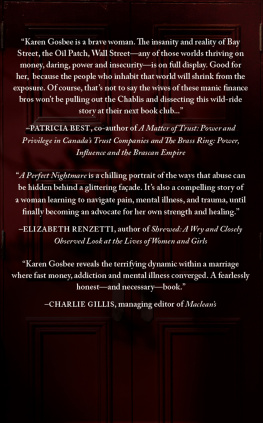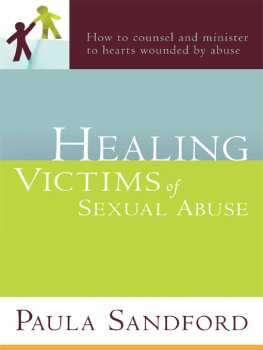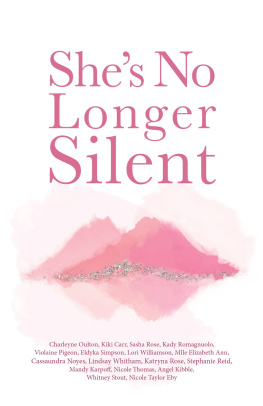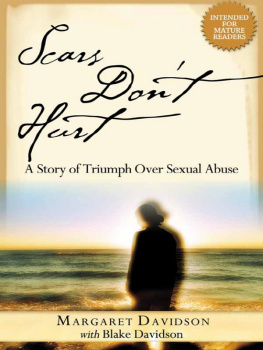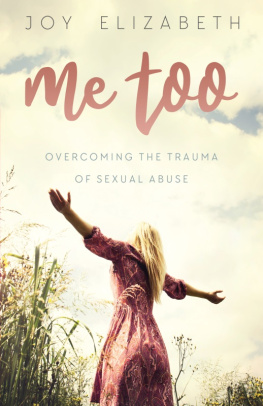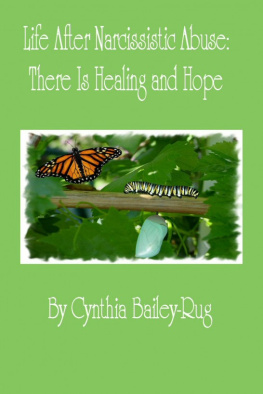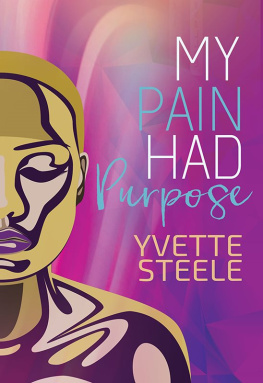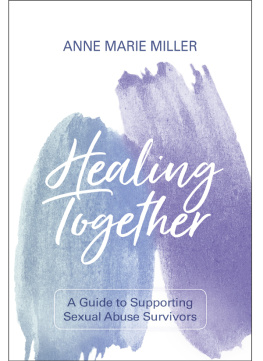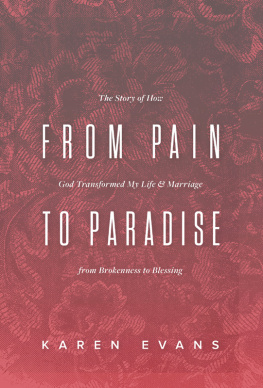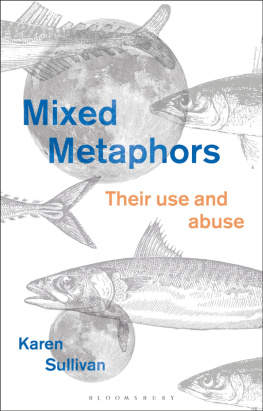

Sutherland House
416 Moore Ave., Suite 205
Toronto, ON M4G 1C9
Copyright 2020 by Karen Gosbee
All rights reserved, including the right to reproduce this book or
portions thereof in any form whatsoever. For information on rights and
permissions or to request a special discount for bulk purchases, please
contact Sutherland House at
Sutherland House and logo are registered
trademarks of The Sutherland House Inc.
First edition, October 2020
If you are interested in inviting one of our authors to a live event or
media appearance, please contact
and visit our website at sutherlandhousebooks.com for more
information about our authors and their schedules.
Manufactured in the United States
Cover designed by Lena Yang
Book composed by Karl Hunt
Library and Archives Canada Cataloguing in Publication
Title: A perfect nightmare : my glittering marriage and how it almost cost me my life / Karen Gosbee.
Names: Gosbee, Karen, author.
Identifiers: Canadiana 20200296388 | ISBN 9781989555330 (softcover)
Subjects: LCSH: Gosbee, Karen. | LCSH: Gosbee, KarenMarriage. | LCSH: Abused wivesCanadaBiography. | LCSH: Wife abuseCanada. | LCSH: Marital violenceCanada. | LCGFT: Autobiographies.
Classification: LCC HV6626.23.C2 G67 2020 | DDC 362.82/92092dc23
ISBN 978-1-989555-33-0
This book is dedicated to those who have been silenced.
May you find help, joy, and the strength to start
your own new chapter.
N OVEMBER 12, 2017, and everything is coming to a head. Im driving to the house as the sun is setting and the temperature dropping. In my mind, there is a sickening certitude. I know exactly where George will be and what he will have done. My brother Scott is in the car beside me. He called just as I was leaving and insisted he come along in case of a confrontation. My family has feared for my safety throughout my marriage, and their concerns have ramped up exponentially in the last week.
Its a Sunday. On Wednesday, I had asked George for a divorce after taking precautions for the safety of myself and my children. George had been violent over the course of our marriage and I did not expect him to respond well to my request. On Friday night, he had begun texting maniacally, a sure sign he was drinking again. Wed spent six hours hamster-wheeling, crossing the same ground over and over. He pleaded with me to meet him to look at papers about our finances. Every fibre in my body told me that would be a mistake. I was finally trusting my instincts. I woke the next morning to a stream of angry texts that had ended at 3 a.m.
As Scott and I approach the house, memories are flashing through my mind like a slideshow. George and I getting married in Turkey, so young and unprepared. The early fights. Me with my babies alone in big, beautiful houses. George drunk, asleep at the dinner table. George curled into a fetal position on the floor. George threatening suicide. George threatening me. I think of the decades I lived in terror of a certain look from him, how I was always walking on eggshells, waiting for the next outburst. I think of us fighting, us laughing, us fighting, then having sex. I think of the facade we constructed. Then I think about Georges fist pounding my face in a Buenos Aires hotel room.
My most troubling memory was of the time Id called the police after George pinned me down on the bathroom floor and tried to strangle me. My daughter Isla couldnt understand why I had called the police. Her father hadnt actually hurt me, she said. That was one of the many moments that led to my realization that it would be best for me to leave him, for my own safety and that of my childrenwhat kind of an example was I setting?
I am keenly aware that, throughout our marriage, the wider world has seen the version of George Gosbee that he has wanted people to see: a successful man of forty-eight, known for his boundless energy, his towering business achievements, his enthusiasms, his grandiose gestures. He has built two investment companies from the ground. He was a co-owner of the Arizona Coyotes NHL hockey team, and has served two prime ministers. He climbs mountains. He hunts. He heli-skis. He reads and does yoga and cooks. We have a family, with three beautiful children: Instagram-perfect.
The other side he hides from view. Our family has lived under his dark cloud for decades. We live with the roller coaster of Georges alcohol and substance misuse, his suicide attempts, his violence and abusive behaviour, and his repeated attempts to get better through therapy and rehab. Hes been diagnosed with ADD, bi-polar disorder, and borderline personality disorder, and has been prescribed a long list of medications that he either doesnt take, or takes sporadically, fearing theyll dull what it is that makes him so successful. (Its not uncommon for mentally ill people to start and stop their meds or recovery plans.) The truth is that Georges life has been one long fight: fighting for success, fighting for social approval, fighting his addictions, fighting me, fighting to stay alive, and fighting to keep these parts of himself from being discovered.
How things look is everything to George. He repeatedly tells me and the children that perception is everything. He associates personal success with public accolades and external recognition, and does not feel any personal satisfaction without them. He believes his reputation will be destroyed if his mental illness, or his behaviours, are revealed. That terrifies him in a way that a cancer diagnosis or a heart condition would not. His obsession with optics is why I worried about his response to my asking for a divorce; but I could no longer live for the sake of appearances, and neither could my children.
I park the car and walk toward the house.
M Y MARRIAGE WASNT MY introduction to how addiction and mental illness can harm a family. My childhood was. My mother suffered from depression and what we now call substance use disorder. When I was twelve, she attempted suicide. Still, as a child growing up, I believed my family was normal. It was all I knew.
From the outside, my childhood probably looked idyllic and privileged. I grew up Karen Wilson, the youngest of three. My father, Fred, was a successful neurologist. My mother, Laura, was a beautiful stay-at home mom. In family photos of us on the beach, goofing in the backyard, in our kitchen with its 70s avocado-coloured appliances, were always smiling. But my smile is forced and uncertain, a detail I now understand.
Life inside our two-story, green clapboard house on Marlboro Road in Edmonton was anything but idyllic. My mothers depression began after my birth. It was what we now know as postpartum depression; back then, it was the baby blues. Like many women, my mother was prescribed Valium: mothers little helper. And, like many women, she developed a dependency. She would regularly top the pills off with a glass or two of sherryessentially doubling the depressants.
My mothers state wasnt helped by our family moving to a new neighbourhood when I was two so we could be closer to my dads family. She was unsettled by that dislocation. And also by the fire. Our new home went up in flames after rags ignited in the furnace room. My crying in response to the smoke woke the household, according to family lore. We lived in an apartment while the house was repaired.
I was an anxious child, absorbing the tensions and sadness at home like a sponge. One of my first vivid memories is of my first grade teacher assigning parts for the Christmas play, and that I desperately wanted to be an angel. As she did so, a classmate burst into the room to report a pedestrian had been struck by a car outside. The person wasnt hurt, she said, but the woman driving the car was crying uncontrollably. My heart sank. I knew the driver had to be my mother, whod just dropped me off. And I knew I wouldnt be an angel because I wasnt outgoing enough, and Id have to manage my mothers sadness. When I got home, I found her sitting on the stairs sobbing. Shed often cry, perched there.
Next page
